Table of Contents
Daily Current Affairs for Government Exams:
Today Current Affairs: 9th January 2020 for UPSC IAS exams, State PSC exams, SSC CGL, State SSC, RRB, Railways, Banking Exam & IBPS, etc
Contents:
- E-Commerce Market of India.
- Protecting power.
- Pradhan Mantri Laghu Vyapari Maan-dhan Yojana.
- APEDA
- National Assessment and Accreditation Council (NAAC):
- Indian Pompano fish cultivation.
- Natural Gas Pipeline Grid.
- International cooperation in health.
- The epiphany festival.
- TOI 700d
- Plea on Scheduled Caste Status to be Religion Neutral.
- Legal assistance from foreign countries in criminal matters.
- Wetland Conservation Rules.
- Include re-grassing of mined areas
- LIGO(Laser Interferometer Gravitational-Wave Observatory) project.
- A passenger plane bound for Ukraine exploded:
- CISF.
- Forbes list.
- Other important current affairs.
1. E-Commerce Market of India:

The Competition Commission of India (CCI) released its report on Market Study on E-Commerce in India.
Key Findings of the Market Study Report
- The revenue from the E-Commerce sector is growing at a rate of 51%.
- In July 2018, the number of online transactions in the E-Commerce sector was 1 to 1.2 million per day.
- Between 2016 and 2019, the delivery market places in the food industry raised by 90%. Also, the food industry is no longer a metro phenomenon. It grew in non-metro cities as well.
- The online travel booking is growing at 16% since 2016.
- The E-Commerce Sector was established in 2009. However, the sector gained momentum in 2014. In 2017, the sector held 3,500 million USD investment. There are around 4757 E-commerce start-ups in India today in 2019.
2. Protecting Power:
An American drone has killed Iranian military and intelligence commander Major General Qassem Soleimani in Baghdad (capital of Iraq). The Iranian government has registered its protest against the killing with the Embassy of Switzerland in Tehran
Qassim Soleimani was an Iranian Major General in the Islamic Revolutionary Guard Corps (IRGC) and, from 1998 until his death in 2020, commander of its Quds Force, a division primarily responsible for extraterritorial military and clandestine operations.

- Switzerland represents the interests of the US in Iran (capital of Iran). This is because the US itself does not have an embassy there. In an arrangement such as this, Switzerland is the “Protecting Power” of the United States’ interests in Iran.
- Iran’s interests in the United States, on the other hand, are represented by the Pakistan Embassy in Washington.
How is the Above Arrangement Possible?
- The instrument of Protecting Powers is provided for under the 1961 and 1963 Vienna Conventions on Diplomatic Relations.
- The 1961 Vienna Convention states that if diplomatic relations are broken off between two States, or if a mission is permanently or temporarily recalled, the sending State may entrust the protection of its interests and those of its nationals to a third State acceptable to the receiving State. E.g.:
- In this case, where Switzerland is the “Protecting Power” of the United States’ interests in Iran, sending state would be the US, the third state would be Switzerland; and the receiving state would be Iran.
- The 1963 Convention reiterates that a sending State may with the prior consent of the receiving State, and at the request of a third State not represented in the receiving State, undertake the temporary protection of the interests of the third State and of its nationals.”
- The Vienna Convention on Diplomatic Relations, 1961 provides a complete framework for the establishment, maintenance, and termination of diplomatic relations on the basis of consent between independent sovereign States.
Vienna Convention on Diplomatic Relations, 1961:
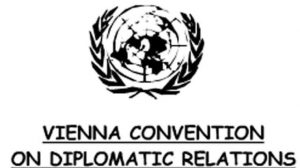
- The Convention was adopted on 14 April 1961 by the United Nations Conference on Diplomatic Intercourse and Immunities held at the Neue Hofburg in Vienna, Austria, from 2 March to 14 April 1961. India has ratified the convention.
- It sets out the special rules – privileges, and immunities – which enable diplomatic missions to act without fear of coercion or harassment through enforcement of local laws and to communicate securely with their sending Governments.
- It makes provision for withdrawal of a mission – which may take place on grounds of economy or physical security – and for breach of diplomatic relations which may occur in response to the abuse of immunity or severe deterioration in relations between sending and receiving States. In either of these cases – or where permanent missions have not been established – a framework is provided for the interests of each sending State to be protected in the receiving State by a third State.
3. Pradhan Mantri Laghu Vyapari Maan-Dhan Yojana:
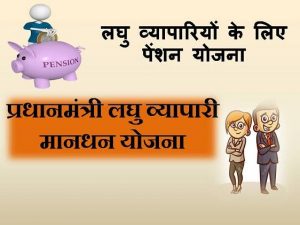
The National Pension Scheme for Traders and Self-Employed Persons has failed to gain traction as only about 25,000 persons have opted for the scheme as against the government’s target to enroll 50 lakh by March-end.
Key facts:
- As per government data, only 84 traders and self-employed persons from Delhi have registered for the scheme so far, while 59 persons from Kerala, 54 from Himachal Pradesh, 29 from Jammu and Kashmir and two from Goa have registered.
- No one has registered for the scheme in Lakshadweep and Mizoram.
- Uttar Pradesh has the highest number of registrations with 6,765 persons.
What is Pradhan Mantri Laghu Vyapari Maan-dhan Yojana?
- It is a voluntary and contribution-based central sector scheme.
- The government launched the scheme, entailing monthly minimum assured pension of ₹3,000 for the entry age group of 18-40 years after attaining the age of 60 years, with effect from July 22, 2019.
- Under the scheme, the government makes a matching contribution to the subscribers’ accounts.
- The scheme is based on self-declaration as no documents are required except bank account and Aadhaar Card.
- All small shopkeepers, self-employed persons and retail traders aged between 18-40 years and with Goods and Service Tax (GST) turnover below Rs.1.5 crore can enroll for the pension schemes.
- To be eligible, the applicants should not be covered under the National Pension Scheme, Employees’ State Insurance Scheme, and the Employees’ Provident Fund or be an Income Tax assessee.
4. Agricultural and Processed Food Products Export Development Authority (APEDA):

800 FPOs registered on the Farmer Connect Portal of APEDA.
Background:
A Farmer Connect Portal has been set up by APEDA on its website for providing a platform for Farmer Producer Organisations (FPOs) and Farmer Producer Companies (FPCs) to interact with exporters.
About APEDA:
- The Agricultural and Processed Food Products Export Development Authority (APEDA) was established by the Government of India under the Agricultural and Processed Food Products Export Development Authority Act 1985.
- The Authority replaced the Processed Food Export Promotion Council (PFEPC).
- APEDA, under the Ministry of Commerce and Industries, promotes the export of agricultural and processed food products from India.
5. National Assessment and Accreditation Council (NAAC):
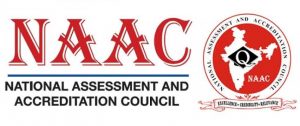
- NAAC is established by the University Grants Commission (UGC) to assess and accredit the institution of higher learning in the country.
- The NAAC was originally formed in 1992 as a result of recommendations from ‘National Policy on Education – 1986’ which emphasizes the deteriorating quality of higher education in the country.
- Functions: The NAAC certifies institutions of higher learning (Colleges, Universities, Institutes, etc) in the country; however, it does not include the institutes providing technical education.
- It is an autonomous organization that assesses and accredits institutions of higher education in India.
6. Indian Pompano fish cultivation:
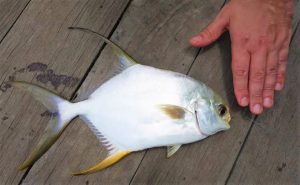
The Central Marine Fisheries Research Institute (CMFRI) announced that it has developed viable scientific methods to cultivate Indian Pompano fish in ponds.
- It is to be officially cultivated in ponds of Vishakhapatnam. This is the first time a scientific experiment has been done on the cultivation of Pompano fish in India.
- The scientific method has recorded 750 grams of meat per fish in open ponds and 1 kg in cages. The method also recorded 95% of the survival of the fishes. The method provided 3 tonnes per acre yield and a profit of 25% to 30% of input cost per acre Pompano
- In 2014, the Government began the scientific study on Pompano.
- The CMFRI scientists say that growing Pompano along with shrimp(a small free-swimming crustacean with an elongated body, typically marine and frequently of commercial importance as food) increases the survival chances of the later. This is because the Pompanos break the life cycle of viruses that attack shrimps.
- The government is currently planning to implement inter-cropping of these two fishes.
7. Natural Gas Pipeline Grid:

On January 8, 2020, the Cabinet Committee on Economic Affairs approved the North East Gas Pipeline Grid. The pipeline is to be constructed for around 1,656 km.
Highlights
- The gas pipeline grid is to be developed in eight states of the North East Region namely Manipur, Meghalaya, Assam, Arunachal Pradesh, Mizoram, Sikkim, Nagaland, and Tripura.
- The project is a joint venture of 5 Public sector units namely ONGC (Oil and Natural Gas Corporation Limited), IOCL (Indian Oil Corporation Limited), OIL (Oil India Limited), GAIL (Gas Authority of India Limited) and NRL (Numaligarh Refinery Limited). The Joint Venture has been named IGGL (Indra Dhanush Gas Grid Limited).
About the Grid:
- The Grid will supply CNG to automobiles, cooking gas to households and fuel to industry.
- The Group Consortium will receive 60% of the funding for the project and the rest has to be raised via debts and equity. The project will be monitored by the Ministry of Petroleum and Natural Gas.
- The Ministry will also release capital for the project in further stages.
8. International cooperation In health:
January 8, 2020, the Union Cabinet approved Memorandum of Understandings India had signed with United Kingdom, Sweden and Bill and Melinda Gates Foundation (BMGF).
- The Ministry of Health and BMGF had signed the Mou in November 2019.
- The BMGF agreed to work with the Ministry to strengthen the health sector of the country.
- It focuses on reducing child mortality, morbidity, maternal mortality, and neonatal mortality. Also, it will aim to reduce the burden of diseases such as Lymphatic Filariasis, Visceral Leishmaniasis, and TB.
- To strengthen health systems, including aspects such as budget utilization, management, and skills of human resources for health, digital health, strengthening supply chains and monitoring systems.
9. The Epiphany festival:

The Epiphany festival was celebrated in parts of India, such as Goa and Kerala. In Goa, the celebration is known by its Portuguese name ‘Festa dos Reis’, and in parts of Kerala by its Syriac name ‘Denha’.
About:
- Epiphany is among the three oldest and major festival days in Christianity, the two others being Christmas and Easter.
- It is celebrated on January 6 by a number of Christian sects, including Roman Catholics, and on January 19 by some Eastern Orthodox churches.
- In the West, the duration between December 25 and January 6 is known as the Twelve Days of Christmas.
10. TOI 700d:

NASA reported the discovery of an Earth-size planet, named TOI 700 d, orbiting its star in the “habitable zone”
- The National Aeronautics and Space Administration (NASA) has reported the discovery of an Earth-size planet, named TOI 700 d.
- The planet was found by NASA’s Transiting Exoplanet Survey Satellite (TESS) mission, which was launched in 2018. With TOI 700 d, TESS has discovered its first Earth-size planet in its star’s habitable zone.
- In comparison to the Earth: TOI 700 d measures 20% larger than Earth. It orbits its star, TOI 700, once every 37 days.
- The star, TOI 700, is an “M dwarf” located just over 100 light-years away in the southern constellation Dorado. It is roughly 40% of the Sun’s mass and size and has about half its surface temperature.
- Two other planets orbit the star: TOI 700 b, which is almost exactly Earth-size, probably rocky, and which completes an orbit every 10 days.
11. Plea on Scheduled Caste Status to be Religion Neutral:
The Supreme Court will examine a plea related to Dalit Christians who demand the same quota benefits reserved for Scheduled Castes.
- The plea also requests that reservation for government jobs and admissions in educational institutions should be made “religion-neutral”.
- Paragraph 3 of the Constitution (Scheduled Castes) Order, 1950 restricts Christians of Scheduled Castes origin from availing the Scheduled Castes status.
- Paragraph 3 of the Constitution (Scheduled Castes) Order, 1950 states that no person who professes a religion different from Hinduism shall be deemed to be a member of a Scheduled Caste.
12. Legal assistance from foreign countries in criminal matters:
The Centre has issued revised guidelines for mutual legal assistance in criminal matters with other nations.
About:
- India has Mutual Legal Assistance Treaties, MLAT with 42 countries and is a signatory to various International Conventions for cooperation in criminal matters. Home Ministry is the designated central authority for the country.
- Under the MLAT, a country can request for obtaining evidence for criminal investigations and prosecutions. The evidence includes witness statements or the service of documents among others.
13. Wetland Conservation Rules:

Ministry of Environment has notified the new Wetland Conservation Rules.
- The revised guidelines will direct how data requests are processed in any criminal investigations.
- The revised guidelines also include the process for issuing directives on drafting and processing letters of request, mutual legal assistance requests and service of summons, notices and other judicial documents.
- Most intermediaries and social media platforms such as Facebook, WhatsApp, Google, Yahoo!, Twitter and YouTube have their servers outside India. And thus Indian investigation agencies need to follow a particular procedure to access the data from these platforms.
- The revised norms have come in the backdrop of recently tabled Personal Data Protection Bill, 2019 in the parliament.
14. Include re-grassing of mined areas:
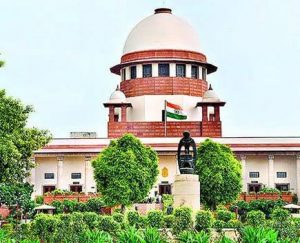
Recently, the Supreme Court of India ordered the government to include re-grassing of mined areas as a mandatory condition in every mining lease, environmental clearance, and mining. It also held that mining leaseholders should take responsibility for re-grassing mined areas so that biodiversity can flourish in such areas.
Key Points from the Order:
- The SC ordered the government to file a report in three weeks after taking appropriate actions and directed it to devise methods to ensure compliance by mining leaseholders.
- The cost of re-grassing the mined area and wherever damage was caused, would be entirely borne by the license holder.
- Mine closure plan imposes conditions on the license holder to restore biodiversity. The mandatory re-grassing would be in addition to these conditions.
- The apex court held that mined areas result in the complete elimination of grass and denies fodder to herbivores.
- Re-grassing of such mined areas is the only solution so that grass and other vegetation, including trees, can grow in the mining area for the benefits of animals and the land is restored to a condition that is fit for the growth of fodder, flora, fauna, etc.
15. LIGO(Laser Interferometer Gravitational-Wave Observatory) project:
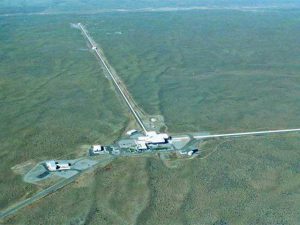
An international team led by LIGO-Virgo scientists has identified another event of gravitational ripples from a collision of two neutron stars, making it the second time this type of occurrence has ever been observed in gravitational waves.
What is LIGO?
- It is a massive observatory for detecting cosmic gravitational waves and for carrying out experiments.
- The objective is to use gravitational-wave observations in astronomical studies.
- The project operates three gravitational-wave (GW) detectors. Two are at Hanford, Washington, north-western US, and one is at Livingston in Louisiana, south-eastern US.
- The proposed LIGO India project aims to move one Advanced LIGO detector from Hanford to India.
About LIGO- India project:
- It is piloted by the Department of Atomic Energy (DAE) and the Department of Science and Technology (DST).
- The LIGO-India project will be jointly coordinated and executed by three Indian research institutions: the Inter-University Centre for Astronomy and Astrophysics (IUCAA), Pune and Department of Atomic Energy organizations: Institute for Plasma Research (IPR), Gandhinagar and the Raja Ramanna Centre for Advanced Technology (RRCAT), Indore.
- The project will bring unprecedented opportunities for scientists and engineers to dig deeper into the realm of gravitational waves and take global leadership in this new astronomical frontier.
- The LIGO-India project will also bring considerable opportunities in cutting-edge technology for the Indian industry which will be engaged in the construction of the eight-km long beam tube at ultra-high vacuum on a leveled terrain.
- With its establishment, India will join the global network of gravitational wave detectors.
- Establishing an observatory in India also assumes importance because the further the distance between the observatories, the greater will be the accuracy in locating gravity waves.
16. A passenger plane bound for Ukraine exploded:

On January 8th, a passenger plane bound for Ukraine exploded, just minutes after takeoff killing at least 176 people on board there have been some contradictory statements from officials in both Iran and Ukraine.
- The plane’s so-called black boxes could help answer some of those questions, but Iranian officials may not turn the devices over to Boeing, which would typically be involved in an investigation into what went wrong.
What is a Black Box?
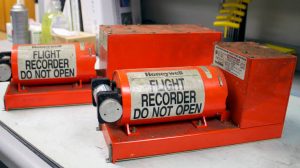
- Any commercial airplane or corporate jet is required to be equipped with a cockpit voice recorder and a flight data recorder. It is these two items of separate equipment which we commonly refer to as a ‘Black Box.’
- While they do nothing to help the plane when it is in the air, both these pieces of equipment are vitally important should the plane crash, as they help crash investigators find out what happened just before the crash.
- To help locate the cockpit voice recorder and a flight data recorder in the aftermath of a plane crash that occurs at sea, each recorder has a device fitted to it known as an Underwater Locator Beacon (ULB). The device is activated as soon as the recorder comes into contact with water and it can transmit from a depth as deep as 14,000 feet.
17. Central Industrial Security Force (CISF):
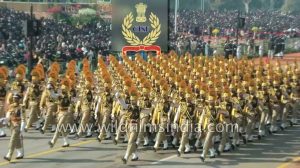
The Supreme Court has asked the Union government to explore the possibility of creating a special wing of Central Industrial Security Force (CISF) for providing security to courts across the country, including the high courts and the SC.
About CISF:
- CISF is an armed force of the Union established under an Act of Parliament, “Central Industrial Security Force Act, 1968 (50 of 1968)”.
- According to the mandate, CISF provides security to the premises staff along with the security of property and establishments.
18. Kanhaiya Kumar and Prashant Kishor in Forbes

Youth leaders from Bihar Kanhaiya Kumar and Prashant Kishor included in the Forbes India list of 20 people to watch in the 2020s.
- Poll strategist Prashant Kishor is Janata Dal (United) National Vice President while Kanhaiya Kumar is former President of Jawaharlal Nehru University Students Union.
- Kanhaiya Kumar finds 12th position in the list while Prashant Kishor is at 16th
- Indian origin US-born political commentator Hasan Minhaj is on the 1st position while Keyna’s Marathon runner Eliud Kipchoge in on the 20th place.
- Other Indians who find a place in the list is Dushyant Chautala (deputy chief minister, Haryana), Mahua Moitra (Lok Sabha member, Trinamool Congress), the Godrej family (of Adi Godrej) and Garima Arora.
President of Sri Lanka Gotabaya Rajapaksa also figured in the list.
Other important daily current affairs:
1. The Union Cabinet chaired by PM Modi approved the agreement between India and Mongolia to explore outer space for civilian and peaceful purposes. The countries signed the agreement in September 2019.
2. January 8, 2020, the Union Cabinet approved Memorandum of Understandings India had signed with United Kingdom, Sweden and Bill and Melinda Gates Foundation (BMGF). The Ministry of Health and BMGF had signed the Mou in November 2019.
The BMGF agreed to work with the Ministry to strengthen the health sector of the country. It focuses on reducing child mortality, morbidity, maternal mortality, and neonatal mortality. Also, it will aim to reduce the burden of diseases such as Lymphatic Filariasis, Visceral Leishmaniasis, and TB.
3. The fifth Pulses Conclave 2020 is to be held in Lonavala, Maharashtra between February 12, 2020, and February 14, 2020. It is a biennial conference.
4. The World Bank released its Global Economic Prospect. According to its forecast, the world is expected to grow economically at a rate of 2.5%. This is the lowest prediction since that predicted in 2008-09, 3.1%. By then, the global financial crisis derailed the economy.
5. Telecom companies, including Bharti Airtel and Vodafone Idea, have urged an open court hearing of their petitions seeking a review of a Supreme Court judgment upholding the recovery of past dues amounting to ₹1.47 lakh crore from them.
6. Researchers at the University of Monash in Australia have managed to create a super-capacity prototype by re-engineering a Lithium Sulphur (Li-S) battery.
- Li-S batteries are not new. But they had an intrinsic problem with the sulfur electrode, which would break after repeated charge cycles, making its superior capacity redundant.
- The sulfur cathode would break because of expansion and contraction during cycles.
- This battery has five times the capacity of a traditional lithium-ion battery. It can retain 99 percent of its charge even after 200 charge cycles.
- Li-S batteries are also many times cheaper than lithium-ion batteries that could bring down the cost of electric mobility.
7. Zoran Milanovic of Croatia has won the presidential election of the country. He defeated incumbent conservative leader Kolinda Grabar-Kitarovic.
8. On January 09, 2020, the Iranian Parliament has approved a triple-urgency bill that designates the US army and the Pentagon as a terrorist entity. The Bill further requires the government to allocate 200 million euro to the Islamic Revolution Guards Corps (IRGC) Quds Force to take revenge for the US killing of Lieutenant General Qassem Soleimani.
9. India-born author Jasbinder Bilan has won the United Kingdom’s Costa Children’s Award 2019’. She won the award for her debut novel ‘Asha and the Spirit Bird’.
10. Apparel Export Promotion Council of India (AEPC) has appointed A Sakthivel as the new chairman of the organization. He is appointed for the period 2020-2021.
11. The political risk consultancy, the Eurasia Group has listed India under Prime Minister Narendra Modi as the fifth biggest geopolitical risk of 2020.




